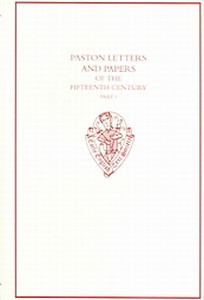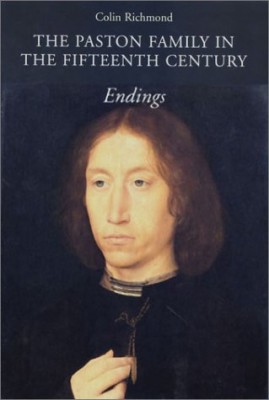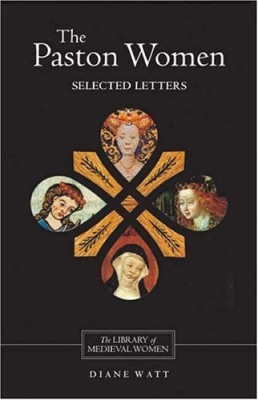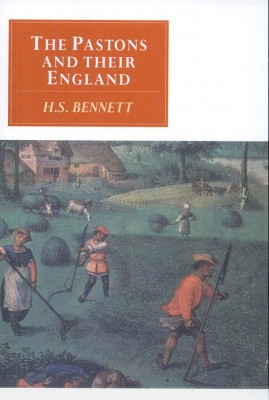The collection known as the Paston Letters is one of the largest archives of 15th-century English private correspondence, comprising about 1000 letters and documents including petitions, leases, wills and even shopping lists. A huge part is now online; but more will follow.
Around 1390 a wealthy landowner by the name of Clement from the village of Paston in Norfolk had saved enough money to let his son, William (1378 -1444) be educated as a lawyer. Ultimately William was to end his career as Justice of the Common Pleas. On the way he succeeded in acquiring an imposing estate from the proceeds of his office. In 1420 he married Agnes Barry with whom he had four sons and one daughter. In a way it is a rather ordinary family representative of the late medieval gentry, to which it obviously belonged even though aspirations at some points ran high.
Nevertheless it is probably one of the most well-known families from that period. During the 15th century a remarkable private archive was amassed of letters, documents, shopping lists and all sorts of bits and pieces. Luck has it, the archive was preserved, and today the unique cache is in The British library (though with a few items at oxford and elsewhere).
For a long time scholars and cultural historians have dipped into this treasure trove to paint a picture of daily life during the War of the Roses. Not least since the letters have been painstakingly edited and published in 1970’s.
Now, however, there is an opportunity to study the letters “in real”: British Library has commenced to digitize the whole collection and already a substantial part has gone online. This is very important because it makes it possible to use the letters as a tool to learn how to read English documents from that period (the edited and published texts can be placed next to the digitized document). Perhaps this might help local historians on the way to exploit documents in their local archives.
So far five volumes containing some of the most studied items have been published: four volumes from 1440-1489 (Add MS 43488, Add MS 43489, Add MS 43490, Add MS 43491) and a volume that contains further material from the second half of the 15th century, together with later correspondence from of the later 16th century (Add MS 33597).But these five volumes are just a part of the large collection of Paston letters and further volumes of the family’s letters and documents are scheduled for digitisation in the future.
SOURCE:
READ MORE:
THE AUTHORITATIVE EDITION:
 Paston Letters and Papers of The Fifteenth Century. Part I-II
Paston Letters and Papers of The Fifteenth Century. Part I-II
By Norman Davies
New Edition: Early English Text Society /Boydel & Brewer 2004
ISBN: 9780197224212
ISBN: 9780197224229
Paston Letters and Papers of the Fifteenth Century Part III
Edited by Richard Beadle and Colin Richmond
Early English Text Society /Boydel & Brewer 2005
ISBN: 9780197224236
Parts I and II of Paston Letters and Papers of the Fifteenth Century, edited by Norman Davis, were originally published by the Clarendon Press in 1971 and 1976, and were reissued with corrections by EETS in 2004. Part III completes the edition. It contains the texts of 120 additional letters and papers, many of them relating to Sir John Fastolf and his circle. These texts are previously unprinted, or printed only in part; some only came to light after the publication of Parts I and II. The texts have been edited according to the principles established by Norman Davis, and are accompanied by an Introduction and Bibliography, as well as a consolidated index to all three parts of the edition, a glossary to the entire edition, a concordance of the principal editions and origal sources, and a working chronology of the documents. Norman Davis was formerly Merton Professor of English Language and Literature at the University of Oxford, and Director of the Early English Text Society. Richard Beadle Richard Beadle is Reader in English Literature and Historical Bibliography at the University of Cambridge and Colin Richmond is Emeritus Professor of Medieval History at the University of Keele.
POPULAR EDITIONS:
 The Paston Letters: A Selection in Modern Spelling
The Paston Letters: A Selection in Modern Spelling
Ed. Norman Davies
Oxford University Press (1983) 2009
ISBN-10: 0199538379
ISBN-13: 978-0199538379
 Private Life in the Fifteenth Century: Illustrated Letters of the Paston Family
Private Life in the Fifteenth Century: Illustrated Letters of the Paston Family
By Roger Virgoe
Weidenfeld & Nicolson1989
ISBN-10: 1555842704
ISBN-13: 978-1555842703
ACADEMIC STUDIES OF THE LIFE WORLD OF THE PASTONS:
 The Paston Family in the Fifteenth Century: Volume 1, The First Phase
The Paston Family in the Fifteenth Century: Volume 1, The First Phase
by Colin Richmond
Cambridge University Press 2002
ISBN-10: 0521520274
ISBN-13: 978-0521520270
 The Paston Family in the Fifteenth Century: Volume 2, Fastolf’s Will
The Paston Family in the Fifteenth Century: Volume 2, Fastolf’s Will
By Colin Richmond
Cambridge University Press (1996) 2002
ISBN-10: 0521520282
ISBN-13: 978-0521520287
 The Paston Family in the Fifteenth Century: Endings
The Paston Family in the Fifteenth Century: Endings
Manchester University Press 2000
ISBN-10: 0719059909
ISBN-13: 978-0719059902
 The Paston Women: Selected Letters
The Paston Women: Selected Letters
by Diane Watt
Series: Library of Medieval Women
Boydell & Brewer 2004
ISBN-10: 1843840243
ISBN-13: 978-1843840244
POPULAR INTRODUCTIONS
 The Pastons and their England. Studies in an Age of Transition
The Pastons and their England. Studies in an Age of Transition
By H. S. Bennett
Cambridge University Press 1922 (1990)
ISBN: 9780521398268
 Blood and Roses: One Family’s Struggle and Triumph During the Tumultuous Wars of the Roses
Blood and Roses: One Family’s Struggle and Triumph During the Tumultuous Wars of the Roses
By Helen Castor
Harper Perennial 2007
ISBN-10: 0007162227
 A Medieval Family: The Pastons of Fifteenth-Century England
A Medieval Family: The Pastons of Fifteenth-Century England
By Frances and Joseph Gies
Harper Perennial 1998
ISBN-10: 0060930551
ISBN-13: 978-0060930554
FEATURED PHOTO:
Caistor Castle, Which the Pastons tried to get control over.
